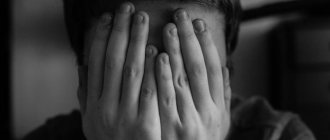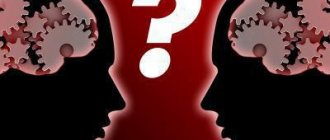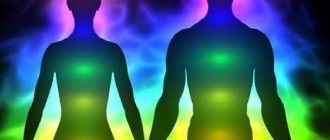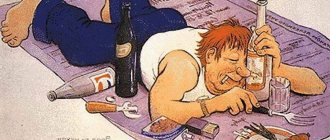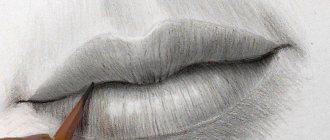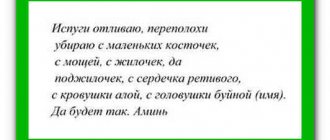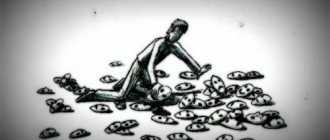Hello everyone, dear subscribers and visitors of our blog! Lyudmila Redkina, a practicing psychologist, is in touch. Do you often feel dizzy, have an increased heart rate, or find it difficult to breathe? Well, there are several reasons for this condition. But in this article I will focus on recurring panic. What is attacking us, why and what will help us resist the onslaught? After reading this article, you will learn how to get rid of panic attacks and why they interfere with our lives so much.
Read each sentence carefully and put the information into practice - help yourself feel better!
Why do PAs occur?
To understand what to do during a panic attack, in which blood pressure rises or your health worsens, we will first focus on the root of the problem.
Why does PA appear in humans?:
- unhealthy diet (excessive consumption of alcohol, coffee and other harmful products);
- lack of sleep and absence (deprivation) of sleep;
- a person’s attachment to the comfort zone and resistance to everything new;
- frequent stress and depression;
- attachment to negative emotions;
- leaving your comfort zone and losing control of the situation;
- encountering something new, lack of experience in it (for example, public speaking);
- old unresolved fears surface and make themselves felt;
- resistance to fear;
- fear of the appearance of fear;
- reluctance to exercise and a sedentary lifestyle;
- various diseases of the body and a person’s focus on them;
- a person has a weak personality, reacting to everything and depending on the external.
How to find your magic remedy?
There is no universal cure for adrenaline crises. There are only widespread ones that are suitable for most patients.
For mild and infrequent panic attacks, the patient can be helped by mild sedatives and adrenergic blockers. But if PAs go beyond all reasonable limits in intensity and frequency, and do not respond to “light” medications, the doctor prescribes tranquilizers that require long-term use.
Therefore, it is important to determine whether the selected remedy should have an “first aid” effect in extreme cases or become a permanent “crutch” that you can fearlessly rely on in all cases of life.
It may happen that the first (and second, and tenth) remedy suddenly turns out to be undesirable for your body. It doesn’t matter whether a doctor prescribes this medicine for you, or recommends it to an experienced pharmacist (or an alarmist friend). It is impossible to predict how the body and psyche will perceive a new drug. Sometimes long months pass before the patient finds a suitable remedy and experiences the long-awaited relief from drug therapy.
In any case, every person suffering from PA should have the necessary information about the most popular means today to help cope with unbearable panic attacks.
Listen to your feeling in your body, stop following logic and reason
- You need to understand that emotions and feelings are not logic . Emotions are born in the solar plexus, but not in the head.
- And in order, feelings and emotions appear first , and then thoughts, and not vice versa, as many people think.
- If something initially comes from logic, and then leads to the experience of emotions , then it is unreal, invented and an exaggeration of the person himself. This leads to a restless and anxious state of panic.
- Your head/logic can tell you anything . Don't follow her.
- You need to make decisions not from your head, not from your mind, but from your body ! I'm not saying that you don't need to think at all, don't exaggerate.
- Initially, listen to your body and the feeling in your body and follow it. This way, you will always know everything about how to deal with panic attacks.
What does it mean to listen to the body?
Listening to the feeling in the body means listening to the feelings inside such as enthusiasm, love, warmth, passion and following them. An unmistakable advisor in decision making is your body. It tells you “yes” or “no” not with a word, but with a feeling.
In other words, it's like listening to your soul .
What happens in fact: you feel the energy in the body, and you must use it.
After all, in the end it turns out that we live for feelings.
What is a panic attack
Panic attacks are uncontrollable panic attacks. This is a pronounced anxiety that is not limited to a specific situation or circumstances. Outbursts of intense fear often occur for no apparent reason. The condition is accompanied by numbness with various physiological abnormalities: lack of air, sweating, loss of voice, rapid heartbeat.
Expert help
Sergey Litan
Psychologist, psychoanalyst, researcher
Ask a Question
Hello, my name is Sergey. I am an expert in the field of psychology and psychoanalysis. I work by passion and love my job. I specialize in depression and anxiety. Over 20 years of practice, I have helped hundreds of people get their results: get out of depression, regain joy in life, put their inner state in order, get rid of fears, phobias and panic attacks. Years of research have allowed me to find the most effective “tools” for solving almost any situation and life scenario.
Tell me about your problem and I will help you.
I had never thought about how common panic attacks (PA) are. It turns out that about 5% of the world's people are susceptible to this syndrome, and most often it manifests itself in young people from 20 to 30 years old! Women's PAs are a common occurrence; they occur less frequently in men.
What is the essence of this syndrome and why does it interfere with life? The fact is that PAs arise when you least expect them. Like in that song: “Love will unexpectedly appear when you least expect it...”
Imagine the situation: you are standing in a beautiful dress on stage as the host/host of a party. And then, hello, the PA begins: treacherous circles on a satin blue dress (or a beautiful burgundy shirt), the heart is pounding, there is not enough air, the voice disappears, there is noise in the ears... And you need to entertain the audience. It is clear that there is no time for entertainment anymore. This is how the career of a toastmaster will end... Cool? Don't think…
A panic attack causes a sharp release of the stress hormone - adrenaline. And the whole body begins to quickly prepare for a potentially dangerous situation, the “fight or flight” mechanism is launched. At the same time, breathing is faster, the heart works faster. What happens next?
And then hyperventilation of the lungs occurs in the body, the level of carbon monoxide in the blood decreases, which leads to numbness of the limbs, tingling in the fingers and sometimes on the scalp.
Under real stress, fighting or running, this is an absolutely normal phenomenon for the body. While running, we don’t even notice such changes in ourselves. But when our well-being changes out of the blue, this is completely useless. This is a failure in the body's system when the “emergency protection” is turned on for no reason.
Panic attacks are not a harmless disorder. Many people develop depression due to PA, which is difficult to cope with, but possible!
Act contrary to the thoughts that cause suffering and do not identify yourself with them
- If thoughts appear and make you worry , do everything against them and do not follow them. Even if some excuses come up and it seems strange to you, still act contrary to the restless thoughts.
- These thoughts are not yours and should not be considered yours . Because they make you feel bad about yourself.
- Do not identify yourself with thoughts , and you will always know what to do with panic attacks during the next outbreak.
Stop the attack with medication
Drugs from the group of tranquilizers (anxiolytics or anti-anxiety drugs) help stop a panic attack if you take the pill at a time when it is still in its infancy.
Tranquilizers cannot be taken by everyone; they are sold by prescription, so they must be prescribed by a psychiatrist or psychotherapist.
Panic attacks. Why don't pills help?
Take a contrast shower or a soothing bath
As the cliché goes, when I got home and took a shower, I washed the day away.
As soon as the next attacks appear, you can immediately take a contrast shower.
This technique is also useful for those who are wondering how to deal with panic attacks during VSD.
About contrast showers
- You need to douse your entire body from head to toe.
- With an interval of about 20 seconds, you douse yourself with both hot and cold water.
What are the benefits of a contrast shower or bath:
- A contrast shower strengthens your blood vessels.
- Water will relieve tension from the body and cleanse you.
- A warm, pleasant bath will be a good soothing preventive measure to combat panic attacks during VSD.
Therapy at home
The main task of treating the disease is people's fear of possible relapses. Patients often feel inferior. When there is a desire to get rid of such problems, you need to resort to the recommended therapeutic measures. You need to do physical exercise, take pills, attend psychotherapy sessions, strengthen the body, and eliminate factors that contribute to the occurrence of seizures.
The goal of therapy is to reduce the number of panic attacks, as well as their intensity . The patient needs to get rid of the symptoms and remember the signs of occurrence. Treatment is allowed at home. In addition to physiotherapeutic procedures, you need to perform exercises for relaxation and mastering the correct breathing techniques.
To neutralize the consequences of an attack, you need to use paper or plastic bags for normal breathing. This will reduce the rate of hyperventilation and unpleasant symptoms. Below you need to familiarize yourself with the various techniques.
Sign up for a massage, relieve tension from your body
Body tension is one of the common signs of panic attacks.
Since PA puts your body into tension and stupor, a massage will relieve this tension.
What are the advantages of massage:
- Thanks to the massage, you will have a relaxed body without tightness and tension.
- Internal relaxation and peace will emanate from you.
Which areas of the body are beneficial to massage?:
- fingers;
- shoulders and neck;
- ears.
Meditate for 20 minutes 2 times a day: in the morning and before bed
How to do meditation step by step:
- Just sit in a position that is comfortable for you and watch your breathing for 20 minutes.
- You do not resist any thought that arises in your head, you observe the thought and let it come and go.
- The flow of thoughts is limitless. By resisting, you will only increase their appearance. That's why you don't fight them, but look at them from the outside, knowing that they will leave.
- Your main focus is on breathing, everything else does not exist for you for 20 minutes.
- It will be hard at first, there will be a lot of resistance, but then it will turn into a pleasant recovery process.
The benefits of meditation:
- After a while, a stable calm will appear.
- The internal dialogue will begin to disappear, you will delve less into your head.
- You will learn to control your emotions and flow of thoughts. This way, you won't be so worried about how to prevent a panic attack.
- You will understand that in order to feel good, you do not need to depend on something. This should be your permanent independent state.
more about meditation and how to perform it flawlessly on the website here.
Helpful information
Let's look at some information that will be useful to know. Panic attacks occur in more than 2% of the population; not a single case of death has been recorded. Fear, anxiety, essential components of a vegetative crisis. A seizure always occurs after overload and stress.
No matter how severe the attack, it can always be stopped. You must always be prepared for the recurrence of a seizure. During quiet times, people's well-being does not worsen. You need to constantly prepare for seizures in order to alleviate your own condition.
Often, seizures appear at night, starting with special sensations. Patients feel a surge of strength, and the state of drowsiness completely disappears. Breathing becomes noticeably easier. Intestinal motility improves. Then a panic attack overtakes the person in waves.
Do yoga
If you want a real martial practice, then this is yoga.
The gym is good, but it doesn't affect you mentally as much as yoga.
Yoga will be an effective help for you during panic attacks, where you will relieve all tension from different parts of the body.
Real yoga (not some fitness yoga or fitness relaxation) is psychologically and physically much harder than any other physical sport or gym.
Yoga sometimes makes you cry or want to run away.
This happens because it is a very tough experience for many muscle groups to hold their body motionless in different geometric positions.
These positions are also called asanas.
Pros of doing yoga:
- Only through asana will you work your core muscles and be able to enter another state of higher consciousness.
- As they say, yoga in the morning makes your whole day much easier.
- Thanks to yoga, you will have a lot of energy in your body for several days ahead.
How to quickly relieve a panic attack at home: 13 exercises
It takes a lot of effort to overcome such panic attacks. Many people get hooked on pills, but it doesn't lead to anything good. Only working on yourself can give positive results and you will soon forget about the attacks of PA.
So, you're having a panic attack, what should you do? Calming down during a panic attack is almost impossible, but very necessary. To do this, read the steps below:
- Drink up to 200 g of cold water. This will refresh your mind, reorganize the internal processes in the body to work normally, and not to a burst of energy.
- Activate your inner voice: speak out everything you do. For what? When you talk to yourself, encourage yourself, support yourself, then your brain tunes in to positivity. And the psyche seems to heal itself.
- Breathe deeply. A deep, slow breath saturates the blood with oxygen, restores heart rhythm, and slows down the flow of blood through the vessels. This is a natural recovery of the body without sedatives.
- Start singing. A song is an emotional action. It also has a beneficial effect on the body. Even children who stutter are advised to recite all phrases.
- Warm your hands until warm: either rub them together or massage them with a rubber massage ball. When PA occurs, blood does not flow to the extremities, heat helps restore blood flow, and you become distracted.
- But you should cool your face to restore breathing and sober thinking. If PA hits you in the car, open a window or turn on the air conditioner. If you are indoors, wash your face with cold water and refresh yourself.
- Relaxation of the body. I once heard that in the USA, soldiers are specially taught to relax their face and body in order to fall asleep in 30–50 seconds. With PA, it is also important to learn how to quickly relax at least your face - sit down, lie down. Imagine that you are in zero gravity, “turn off” all facial expressions. Another secret: when the face is relaxed, the jaws do not close. Pay attention to this.
- But when the body relaxes, the brain must increase its work. During a panic attack, the brain is blocked - it cannot think soberly. Therefore, it needs to be “loaded” with abstract information: solve problems, repeat learned foreign words if you are driving, look at the route map and make your own, solve a crossword puzzle, color by numbers.
- Switch to positive emotions. Remember last year’s trip abroad or to the forest, think about your plans for the next week. Finally decide to rearrange the furniture in the room. Positive emotions will be the beginning of changing your life for the better, taking action and getting rid of PA.
- If there is some animal (cat, dog) within a radius of 1 meter from you, do not hesitate to talk to it. Seriously! Say: “Don't bark!” or “Meow, meow, I don’t have anything edible!” This will also work as a distraction, and it’s more pleasant to talk with a living creature rather than with a concrete pillar.
- In case of a sudden panic attack, always stock up on menthol gum. The sharp taste will “attract” the receptors to itself, which reduces sweating, rapid heartbeat, and breathing spasms.
- Develop self-confidence. To the point where you say to yourself: “Speak, speak, I am in charge here, I control myself!”, “I control myself, my body, my thoughts.”
- Keep yourself busy, get carried away with something, look for a purpose in life, even when you don’t want anything. Any mental illness, hear – ANY, can be treated by controlling thoughts, actions and setting goals. Another question is that not all of them are curable. But you can improve the quality of life with emotional disorders with these tips!
Use effective breathing techniques
This breathing technique is useful for those who do not know what to do if they have a panic attack.
When panic anxiety occurs, first take 4 short exhalations in a row and then one long, maximally deep breath of air. Repeat this procedure 50 times.
What are the benefits of this breathing technique?:
- After 50 times, breathing becomes smooth and easy.
- The focus from the logical part is replaced by your body.
- You feel your body, energy more and monitor it. Try to maintain this feeling.
- Negative thoughts begin to recede.
Symptoms of a panic attack
A panic attack has the following symptoms:
- sudden feeling of fear and anxiety;
- fear for your life;
- internal overvoltage;
- emotional excitement;
- lack of control over the situation.
Attacks are also accompanied by irregular heart rhythm, shortness of breath, nausea and vomiting. Headache and nausea may also occur.
Patients report disorientation and dizziness during an attack. Many people complain of lack of air or pain in the heart area.
During an attack, chills, hand tremors, paleness of the face and increased sweating are possible. Many people note the sudden appearance of phobias. The symptoms of a panic attack are different for each patient and depend on many internal factors.
Make the next flash of fear your friend and thank it for appearing
Thank all your attacks for the following reasons:
- The next outbreak of PA shows you your flaws and those weak points that need to be worked on.
- She says that you have triggered something in yourself and your mind.
- She tells you that you need to work on yourself.
- She wants you to not turn a blind eye to the problem, as all people usually do, and to become even stronger than you are now.
So tell her thank you for that.
Change your perception of the problem, make it your friend. So, you can help yourself with panic attacks just by changing your attitude towards them.
You suddenly have these feelings, you should think of it as: “ Hurray!” Great! Finally! Super! "
You should know everything about how to eradicate fear and timidity due to obsessive thoughts and become more fearless.
How to recognize a panic attack in yourself
Panic attacks can be compared to an unexpected unpleasant surprise. This is a manifestation of negative emotions + physiology is involved.
You can even find out for yourself whether you are susceptible to PA. I will list 13 symptoms, and if you have at least 4 of them, then congratulations - this article is for you:
- Fear of death.
- Feeling short of breath.
- Fear of going crazy, losing control of your behavior.
- Accelerated heart rate.
- Feeling of unreality, alienation from oneself.
- Numbness, tingling in the limbs.
- Pain, discomfort in the chest.
- Nausea, upset stomach.
- Dizziness, malaise, instability of feelings.
- Chills or hot flashes.
- Feeling of suffocation.
- Trembling, local tremor.
- Increased sweating.
Well, have you diagnosed yourself?
Pay attention to points 1, 3, 5. These symptoms relate to the cognitive sphere of a person. With frequent manifestations of PA, the personality is “lost” - sometimes obsessive thoughts arise that the body is here and the mind is somewhere, because of this there is a fear of losing this “traveling” mind. Thoughts become confused, a person ceases to control and manage his emotions.
The remaining 10 points indicate a change in the state of the body. It is difficult for you to live an ordinary life, since the autonomic nervous system is malfunctioning. By the way, people with vegetative-vascular dystonia (VSD) are more susceptible to panic attacks, since this is their weak point in the body.
Girl having a panic attack
Your logic automatically assumes the worst every time you encounter the unknown.
- When logic encounters something new and unknown , it begins to play scary pictures in its head. This has been preserved since the times of the caveman.
- When faced with the unknown, the “fight” or “flight” instincts are triggered. You should know everything about how to stop worrying about a fight, even if it doesn't happen.
- Once again, logic is not your friend . There is no need to follow logic.
- Here you need to realize that where there is the unknown, there is life and bloom . And in the comfort zone there is stunting. There is no need to run away from life.
- Just like, for example, a river always flows and life is always seething in it . And the pond can become a swamp and wither away lifelessly.
Understand this and realize it, and you will no longer wonder about how to deal with panic attacks yourself.
An integral part of treatment
If you yourself are not able to improve your psycho-emotional background, seek help from a specialist. Psychotherapy is an integral part of the treatment of panic attacks. It is she who will allow you to get to the very essence, to understand why such shocks are happening to you. Along with “diagnosis” of the problem, it allows you to find ways to solve it.
The main method of psychotherapeutic treatment of panic disorder is cognitive behavioral therapy . It relieves anxiety and allows you to change the patient’s perception of his problem. The following techniques are used:
- self-observation diary;
- immersion in an alarming situation;
- meditation, muscle relaxation;
- proper breathing techniques.
The course of therapy is 10–20 sessions.
Other psychotherapeutic areas are also used in the treatment of panic attacks :
- Gestalt therapy;
- neurolinguistic programming;
- body-oriented therapy.
Hypnotherapy is in wide demand . To characterize it in a rough form, the doctor puts the patient into a trance and in this state instills in him certain instructions for getting rid of panic attacks, that is, he works with the person’s subconscious.
There is a softer form of hypnotherapy -
Ericksonian hypnosis .
In this case, the person is also in a state of trance, but retains the ability to communicate with a psychotherapist. The doctor does not give specific instructions to the patient, but provides him with the opportunity to understand his internal conflicts. Family therapy can also have positive results. It forces us to consider a person’s problem not only as his personal one, but also as a result of a lack of support from loved ones. The method teaches the patient’s relatives how to help him fight the disease and provide support.
Do not neglect psychotherapeutic methods. They radically change the patient’s thinking, attitude towards the situation, and lead him to self-knowledge. Such steps become key in getting rid of unreasonable anxiety.
Film actress Emma Stone first experienced a terrifying panic attack when she was 10 years old. She was visiting her friend. Just sitting down on the sofa, she was suddenly overcome with horror, it seemed to her that the house was on fire. She couldn’t get up from the sofa, sobbing, she called her mother to pick her up.
Since then, panic attacks have become a part of her life. She constantly forced her mother to tell her that everything was fine, nothing had happened, there was no danger. Persistent and long-term psychotherapy helped her get rid of these crises.
Gain more reference experience that nothing will happen and there is no reason to worry
Example 1: Fear of flying on an airplane
For example, a person is afraid to fly on an airplane.
- And now, you are already in it, and you take off. 10 seconds pass, nothing happens. Everyone does their own thing. Everything is fine.
- 5 minutes have passed and absolutely nothing has happened, you are alive.
- 10 minutes pass and you realize that there is not a single reason for alarm.
- A professional pilot who knows his business sits at the helm.
- The scenario from the movie “Lost” will definitely not be repeated.
Let us analyze this method using the example of a person suffering from social phobia, so that he can independently stop a panic attack and close the question of how to overcome shyness.
Example 2: social phobia in a person
The same analogy can be drawn in cases of social phobia, a person’s fear of large numbers of people.
It is enough for a person to go out into the thick of the crowd, the very middle, and after a while understand that:
- No one will point a finger at him.
- The person will not die.
- No one will touch him or even touch him.
- Nobody cares about him at all.
- Everyone has more important things to do.
- So, a person comes to understand that he can still be loud and even dance in front of everyone, and nothing will happen to him for it.
It will be useful to write down all new realizations after such self-experiments in a notebook.
Consequences of panic attacks
After an attack of a panic attack, a person is already afraid to be in the place where it overtook him: in transport, the subway, the stage, etc. Naturally, he will avoid it in the future. Constraints and complexes appear. It’s difficult to get rid of them and become a confident person later. But this is only a small part of the trouble that a PA disorder that is not eliminated in time can entail.
Such an attack leaves a mark on the memory and psyche of the individual. The person, as if defending himself, begins to fear a repetition of such an attack. And this provokes its next occurrence. Some kind of vicious circle.
A panic attack lasts from 5 to 30 minutes. Sometimes this range extends to hours. In advanced cases, attacks occur several times a day. In the early stages - once every 1-2 months.
What are the consequences and dangers of PA:
- The person becomes very sensitive and develops frequent anxiety and even phobias. The number of terrible objects and phenomena for him increases.
- During an attack, when the autonomic nervous system begins to react with disruptions in the functioning of the heart and lungs, the person drinks various medications without controlling himself. And this can already be life-threatening.
- When a person has a seizure and he is driving some kind of transport, this can be dangerous for the lives of those around him. There have been cases when an airplane pilot was “visited” by a PA during a flight. Thank God they work together...
- Sharp fear aggravates other chronic diseases in humans. Often after such panic attacks, the intestines, heart and other organs begin to ache.
- PAs are also dangerous for pregnant women. Not only does the child experience all the outbreaks of stress hormones, but the woman’s coordination is also impaired, which sometimes leads to falls and mechanical damage.
- The most dangerous thing is severe anxiety, which is extremely difficult to cope with, and thoughts of suicide.
In addition, the consequences of PA can be disturbances in the functioning of the heart muscle, increased blood pressure, and disruptions in the digestive and nervous systems.
Psychological consequences include social phobia, loss of communication skills, inappropriate behavior, conscious limitation of social contacts.
Remove the role of the victim and never feel sorry for yourself, don’t think of yourself as a poor sufferer
Everyone plays roles without realizing that they are just roles.
Aren't you tired of being a scared little person with panic attacks?
Get rid of this role. It's not you!
Stop playing the role of a timid sheep and think: “What an unhappy person I am,” “I’m the only one so poor in this world,” “No one pities me or loves me,” “How bad everything is in my life.”
You are stronger and above this.
False advice from people and mistakes that will not solve the problem
- It is useless to change your focus from something internal to something external if the problem is psychological. By doing this, a person simply avoids the problem, instead of solving it once and for all. After all, problems are in the head, not in the outside world.
- Various medications will help little , they will only dull consciousness. But everything will come back as soon as the medicine wears off. In addition, there will be a dependence on these drugs.
Understand that panic attacks can be cured permanently.
Read all 16 methods again and live in harmony.
How to Deal with Panic Attacks: Steps
Of course, after such a description, I want to overcome panic attacks forever as soon as possible, to forget about them like a bad dream.
And here I want to please you: this really can be done, and most often without pills!
Awareness
I'll start with the banal: recognize your problem. Yes. Admit to yourself that this very feeling is a panic attack.
What does this give?
When a person recognizes a problem, he begins to fight it. Understand that at the initial stage of the syndrome you will cope with it easier than when constant attacks of rapid heartbeat, chills and sweating begin.
Learn stress management
In simple words, develop steps for yourself to overcome uncontrollable anxiety. Or at least a simple algorithm of actions:
- take a deep breath;
- open the window for fresh air;
- as a last resort, leave the room so as not to attract the attention of others.
Think about what will be more appropriate and most acceptable in your particular case.
Lead a healthy lifestyle
Here I want to talk about sleep and food. It's no secret that proper sleep improves your emotional state, relieves stress at least temporarily, restores physical and mental balance, and lifts your mood. To recover, an adult needs to sleep 6–8 hours a day, depending on physical activity.
Food can also lift your spirits. Eat more vegetables, drink water, treat yourself to chocolate sometimes, and, of course, use meat and fish in moderation. By the way, sometimes a banal daily routine helps to cope with neurosis. You say: what does the mood for the PA have to do with it? Moreover, systematically low mood and PA are disorders of the emotional sphere and are interconnected.
Free yourself from stress for a while
As a rule, the occurrence of PA is provoked by a certain stressful situation. For example, a person has an accident and after that cannot drive a car due to panic attacks. To recuperate, he needs to ride in the passenger seat for some time. As soon as the attacks are over, you can try to drive a car.
The same applies to any other provoking situations.
Learn relaxation techniques
I will write about first aid during a panic attack below. It is important for you to understand that relaxation techniques are useful not only during PA, but also every day to restore emotional strength.
Relaxation technique
Stop being afraid of attacks
“Easy to say!” – you will answer. But think about it, nothing will change - whether you will be afraid of panic attacks or not. They either exist or they don’t. Panic attacks can actually only be controlled if you are mentally prepared for them. And you will receive this readiness only when fear goes away. You will see, as soon as you conquer your fear, self-confidence and a new life without PA will appear.
Psychotherapy
Emotional disorders are treated not so much with medication as with psychotherapy. Talk therapy can help you cope with anxious thoughts. It is anxious thoughts that give rise to frequent attacks of PA. Psychotherapy helps to ask the right questions during the occurrence of physiological manifestations of panic.
If you do not have the opportunity to visit a specialist, you can put your psyche in order with the following questions:
- What am I afraid of?
- Why am I afraid of this?
- What harm will this situation bring to me?
- What will happen to me if my worst fears happen?
- How long will I feel bad?
- Is this little thing making me feel so bad?
This is just one of the techniques. You can use distraction methods: physical activity, more social contact, playing with children, and so on.
